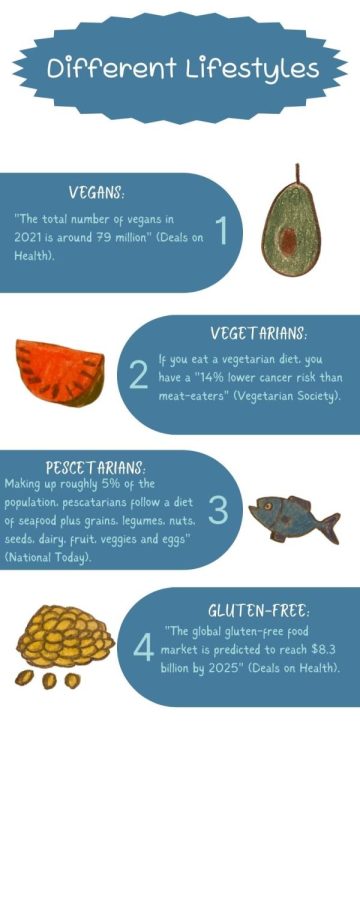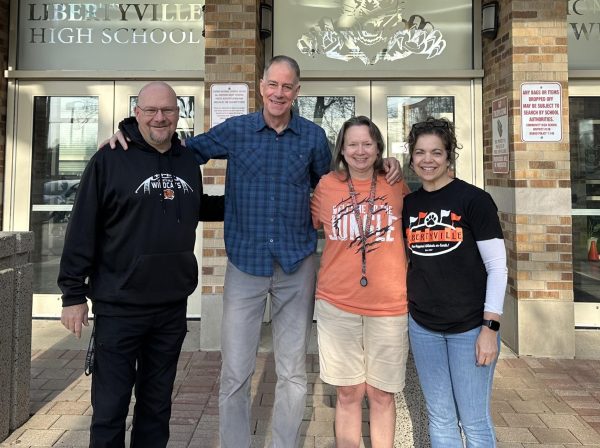Happy and healthy: Exploring alternative diet lifestyles
There are several different diets and food lifestyles that have become increasingly popular. From vegan to vegetarian to gluten free lifestyles, our generation has it all. Many people are adopting these diets due to environmental, ethical and/or health benefits.
In fact, Our World in Data, a non-profit organization, states that 5% of American adults identify as vegetarian and 2% as vegan. Vegetarian includes someone who eats vegetables, fruits, nuts, eggs and dairy products, but doesn’t eat meat. A vegan diet includes anything except animal products such as dairy, meat, eggs and honey. A majority of these adults found in the Our World in Data study are under the age of 35, revealing that younger adults are more likely to participate in these diets, which could be because of social media’s impact.
On the other hand, people may participate due to direct health restrictions. For example, those who have celiac disease, an autoimmune disease that causes an immune reaction to gluten, have gluten-free diets.
At LHS, many students follow these different diet lifestyles. Some choose to do so, while others have strict dietary restrictions they must follow.
Vegetarian
There are many reasons people become vegetarian. Harvard Health Publishing states that some of these reasons may be health, religious convictions, concerns about animal welfare and use of antibiotics or a desire to eat in a way that avoids excessive use of environmental resources.
Sophomore Valentina Perez Klamburg started her journey as a vegetarian three years ago. She started by telling her parents that she had trouble eating meat and fish at home.
“I told them that I didn’t want to eat [those] anymore,” Perez Klamburg explained. “So [my parents] went and talked to doctors and dietitians to try to create a healthy diet for me.”
The Vegetarian Society reports that a healthy vegetarian diet can include foods such as vegetables, fruits, nuts, grains, eggs and dairy. This diet excludes meat.
Perez Klamburg described eating animals as something against her nature; she felt she was doing something wrong when she was eating animals.
“I understand people eat animals because it’s what we’ve done for centuries,” Perez Klamburg explained. “But for me [not eating meat] [would] contribute in stopping massive killings of animals.”
Each year, billions of animals are killed for meat, including pigs, chickens and cows. According to the American Farm Bureau Federation, total cattle slaughter for 2022 came in at 22.49 million, 1.8 percent ahead of 2021. The killing of animals is reason alone for why many people are vegetarian and vegan.
Being vegetarian in a world of meat eaters can be a challenge – especially when it comes to eating out, traveling and spending time with the people you love. Perez Klamburg feels that once you’re vegetarian, you have to accept that.
Additionally, being vegetarian means leaving out multiple sources of not only protein, but also calcium, iron and other vitamins and minerals. Many people, like Perez Klamburg, take supplements for these vitamins and minerals that they can’t find in vegetables.
It’s no surprise that many vegetarians struggle with finding an adequate source of protein, vitamins and minerals to sustain a healthy life. For this very reason, vegetarians are struggling with certain vitamin deficiencies, diseases, eating disorders and even depression.
“When you go out to eat, [you have] to find an option for you,” Perez Klamburg said. “You might find yourself eating salads every time you go out. [Regardless,] when you’re vegetarian, you have to take care of [as] many parts of your healthy life as possible.”
There are many myths about being vegetarian. According to the Academy of Nutrition and Dietetics, a common misconception is that just because something is vegetarian means it is healthy. This also applies to many other diets and food lifestyles. Vegetarian food items can still contain a large amount of sugar and unhealthy fats just like non-vegetarian food items. On the other hand, Harvard Health Publishing states that being vegetarian could possibly prevent you from obtaining major diseases such as heart disease, cancer and type 2 diabetes. Compared with meat eaters, vegetarians tend to consume less saturated fat and cholesterol and more vitamins C and E, dietary fiber, folic acid, potassium and magnesium.
Perez Klamburg feels people always think that because she is vegetarian, she only enjoys eating vegetables. However, this is another common myth. Being vegetarian is not the same as a vegan diet. You can still eat eggs, cheese and milk – which are just as important as vegetables in a vegetarian diet.
“My family tries to include a different part of a different type of food,” Perez Klamburg explained. “We eat a lot of nuts and fruits during meals. [Sometimes we eat] supplements that are made especially for people who don’t eat meat like tofu.”
Gluten-free
Gluten-free diets are another diet growing in popularity, although the reasons for having one often extends beyond choice. Junior Brenna Hornsey is one of the 17 reported students at LHS that have celiac disease, meaning she has to be gluten-free. Hornsey was diagnosed with celiac at 15 years old.
Beyond Celiac, a non-profit organization dedicated to raise awareness for celiac disease, describes celiac as a serious genetic autoimmune disease that damages the inside of the small intestine and interferes with the absorption of nutrients from food. However, many people may be incorrectly diagnosed or undiagnosed with this disease. According to Beyond Celiac, this is the story for up to 83% of Americans who have this certain disease.
For those with celiac, eating gluten can provoke an immune response, which can eventually damage your small intestines’ lining, preventing it from consuming nutrients. This intestinal damage could cause symptoms such as diarrhea, fatigue, weight loss, bloating and anemia, as well as leading to serious complications.
“If I eat something that has [gluten], I could get sick from it,” Hornsey said. “It’s definitely hard to avoid because [gluten] is in so many foods.”
Gluten may be in bread, pasta, baked goods, cereal, crackers and some soups.
“It makes it trickier to eat out [at restaurants], especially with cross-contamination, because I can’t eat foods that are made in a factory with [gluten],” Hornsey said.
Gluten can be cross-contaminated by food, utensils, cutting boards, chef’s hands and by many other forms of equipment in kitchens. Because gluten is a protein (not a type of bacteria), it cannot be ‘killed off’ using heat or disinfecting agents like most bacteria.
Hornsey feels LHS has made some improvements for the gluten-free community. She appreciates the presence of more gluten-free snacks in the cafeteria this year.
Hornsey enjoys gluten-free Oreos, and also claims that the majority of gluten-free pretzels are better than the regular ones.
With the popularity of being gluten-free, vegetarian, and other diet lifestyles increasing, it’s important to remember that any of these ways of living can be achieved if you give your body the important nutrients it needs. Whether that’s from leafy-green vegetables, meat substitutes like tofu, or tasty gluten-free foods, you can easily sustain a healthy body and happy life, just like these LHS students.







